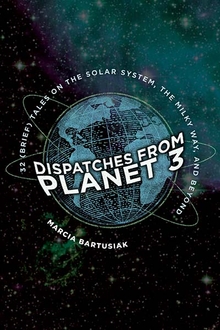 Did Carlo Rovelli, start a fashion for debunking time with The Order of Time? Here’s science writer Marcia Bartusiak, author of Dispatches from Planet 3, asking whether it is time to just get rid of time:
Did Carlo Rovelli, start a fashion for debunking time with The Order of Time? Here’s science writer Marcia Bartusiak, author of Dispatches from Planet 3, asking whether it is time to just get rid of time:
You might say that quantum mechanics introduced a fuzziness into physics: You can pinpoint the precise position of a particle, but at a trade-off; its velocity cannot then be measured very well. Conversely, if you know how fast a particle is going, you won’t be able to know exactly where it is. Werner Heisenberg best summarized this strange and exotic situation with his famous uncertainty principle. But all this action, uncertain as it is, occurs on a fixed stage of space and time, a steadfast arena. A reliable clock is always around—is always needed, really—to keep track of the goings-on and thus enable physicists to describe how the system is changing. At least, that’s the way the equations of quantum mechanics are now set up.
And that is the crux of the problem. How are physicists expected to merge one law of physics—namely gravity—that requires no special clock to arrive at its predictions, with the subatomic rules of quantum mechanics, which continue to work within a universal, Newtonian time frame? In a way, each theory is marching to the beat of a different drummer (or the ticking of a different clock).
That’s why things begin to go a little crazy when you attempt to blend these two areas of physics. Marcia Bartusiak, “Is It Time to Get Rid of Time?” at Nautilus
Bartusiak tells us that one physicist is working on “submicroscopic version of a Newtonian clock, a quantum timekeeper that can be used to describe the physics going on in the extraordinary realm ruled by quantum gravity, such as the innards of a black hole or the first instant of creation.”
Who knows, we might end up hearing a theory aired that “the first instant of creation” (presumably the Big Bang) did not happen in time and therefore technically did not happen. So, like Schrodinger’s cat, we are not here. Or maybe we are. Or both?
See also: Carlo Rovelli: The present is a localized rather than global phenomenon
Cosmologist Carlo Rovelli: Future time travel only a technological problem
Carlo Rovelli: Theories of everything ill-conceived but we can learn to understand quantum mechanics
and
Cosmologist: Philosophy is essential to the development of physics.